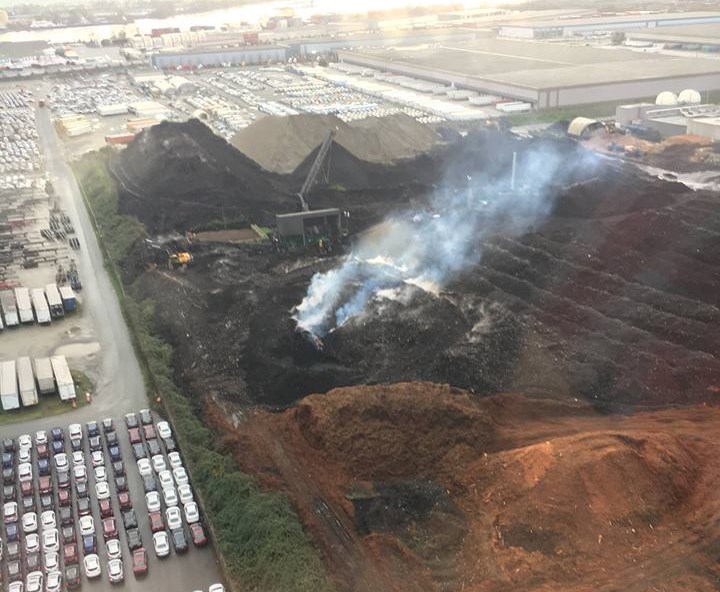The City of Richmond has done an about-face and decided it wants to join the appeal process of Harvest Power’s new air quality permit. However, it is now at the mercy of the provincial Environmental Appeal Board to approve its application considering the deadline has passed.
“The Board’s decision whether to allow the city to gain any status (party or participant) in the appeal is highly discretionary and it may be that our request is denied,” stated a report to Richmond city council Monday night, after staff and councillors drafted the appeal proposal behind closed doors earlier in the day.
Prior to Monday, council had determined it would not appeal the permit issued by Metro Vancouver to the waste-to-energy and compost facility. Mayor Malcolm Brodie said an appeal would have delayed new work to mitigate the noxious odours, which are now resulting in daily complaints from residents.
To date, 25 appeals have been submitted, including one by Harvest Power, which is opposed to some of the permit’s enforcement measures.
At the council meeting at Richmond City Hall, resident Jim Tinson said the odours and volatile organic compounds being emitted from the compost facility will become an election issue if the matter isn’t resolved, and quickly.
“It just has to be closed down. Really, we’re subject to an experiment and the experiment is failing,” said Tinson, who, among others, is calling on residents to stop putting their food scraps in the green bins and divert them away from the facility.
The city has a contract with Harvest Power that expires June, 2019. Details of this contract appear to be sparsely known, even amongst councillors.
“Are we obligated to send our (organic) waste to Harvest Power?” asked Coun. Harold Steves.
“We currently have a contract,” replied John Irving, Richmond’s director of engineering, who tabled the report to council.
At one point, Brodie stopped staff from revealing too many contract details, for legal reasons.
Steves said the problem is likely a result of meat scraps, which should be removed from the compost piles. The volume of such scraps increased dramatically in 2015 when council, via Metro Vancouver, approved its food scraps composting program. In 2012, Harvest Power reportedly took in 27,000 tonnes of organic waste. It is now taking in about 240,000 tonnes, without any significant infrastructure upgrades.
One resident likened Harvest Power to a rendering plant.
“I’m not going to recycle my compost anymore until something is done. The waste needs to be stopped or diverted,” she said.
Tinson said local MLAs should also be leading the charge against Harvest Power, considering — as pointed out by Irving — the Ministry of Environment delegates authority to Metro Vancouver to regulate air quality, via the Environmental Management Act.
Particularly troubling for Tinson is the fact the facility is emitting the likes of ammonia, hydrogen sulphide, aldehydes and other volatile organic compounds, without clear approval from Vancouver Coastal Health or Health Canada.
“It’s frustrating how all these levels of government are not working and cooperating. And they can’t commit to something so basic as fresh, clean air,” Tinson told the News.
The unknown, long-term health risks are not sitting well with residents, many of whom have joined Facebook group Stop the Stink to organize action against Harvest Power.
Even still, there are widespread complaints from people with asthma, who are finding it difficult to breathe in Richmond. Furthermore, the unpleasant smells are affecting quality of life, said Tinson and others.
Resident Gary Cross called the government response “an embarrassment to the community.”
He said Harvest Power’s appeal indicates it is “not a nice company.”
“The permit is very prescriptive of maintenance — something you’d expect a normal company to do,” said Cross.
Harvest Power has stated it will not stop working to improve its infrastructure during the appeal process (it must improve biofilters, reduce waste piles and replace pipes among other things). Rather, it has taken issue with the “sniff test,” whereby Metro Vancouver staff can stop sending the company waste if odours are detected for more than 10 minutes, on four days within a two week period and within five kilometres of the facility. The company called the enforcement measures unscientific.
Metro Vancouver will depend on public complaints to source the foul odours. The city noted complaints have risen immensely in the first week of November. Whereas there were 1,252 complaints in 2016, to Oct. 31, there were 411 from Nov.1 to Nov.8.
Such anger appeared to boil over at council when Coun. Bill McNulty said Harvest Power had “short-changed us on promises.”
“Shut them down,” said McNulty.
Tinson said council was “embarrassed into participating” in the appeal process after citizens did it on their own.
The city stated it may spend $30,000 to $200,000 on the appeal process if it is granted participation by the EAB.
Stop the Stink has indicated it is now gathering evidence of the odours and the impact on the community. Among the many concerns is property values.
A Change.org petition asking for an immediate resolution has about 800 signatures.



